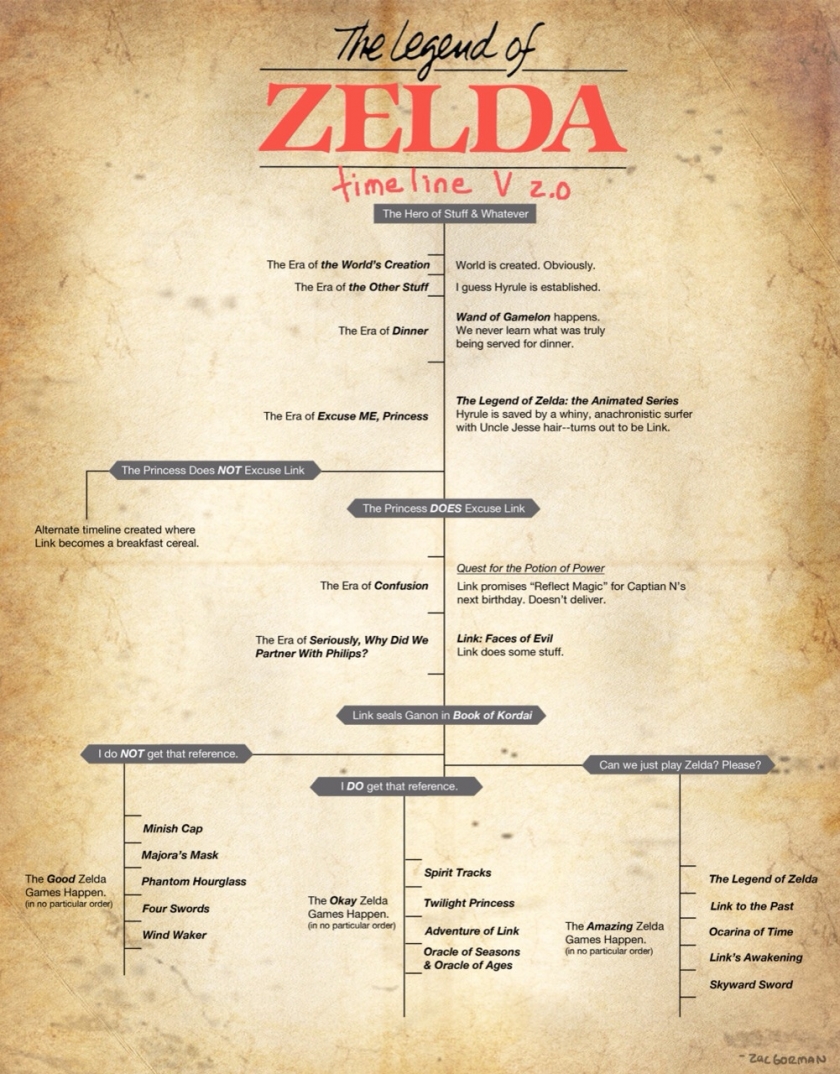Daily Debate: Does Canon Matter?
Posted on August 06 2014 by Jeffrey Edelstein

Amid the chaos that is the cesspool of Zelda fan theories and speculation, there is a glorious beacon of unquestionable righteousness: the Official Zelda Timeline. Graced upon on us by the glorious Eiji Aonuma and his Zelda disciples, this absolute guide to the history of Zelda gave us guidance, helping us to finally realize that the obvious truth we were missing was hidden in the conundrum of time travel in Ocarina of Time. Also, Link apparently died or something (not that this didn’t occur in other titles or anything). However, those behind the Zelda series have said that they don’t want to be restricted by the story, so it seems like the creation of quality creations has higher priority than preserving the doctrine of the Hyrule Historia. Does this belittle the importance of canon in the Zelda franchise?
 It’s no coincidence that the Hyrule Historia and Skyward Sword released so closely to one another. When Skyward Sword was touted as a prequel to Ocarina of Time, albeit an indirect one, the importance of the overarching narrative of the games was suddenly given new importance. Once it was announced that the events of Skyward Sword take place not only before Ocarina of Time but before all previous titles in the series, it was decided: a more clearly organized structure for the series would be necessary in order to make the story truly relevant. Thus, the weighty green tome and it’s accompanying timeline were born, providing us with the a renewed sense of canon for a time.
It’s no coincidence that the Hyrule Historia and Skyward Sword released so closely to one another. When Skyward Sword was touted as a prequel to Ocarina of Time, albeit an indirect one, the importance of the overarching narrative of the games was suddenly given new importance. Once it was announced that the events of Skyward Sword take place not only before Ocarina of Time but before all previous titles in the series, it was decided: a more clearly organized structure for the series would be necessary in order to make the story truly relevant. Thus, the weighty green tome and it’s accompanying timeline were born, providing us with the a renewed sense of canon for a time.
The importance of canon has become newly relevant due to the release of Hyrule Warriors. Yes, Aonuma has confirmed that this is a non-canon title, existing in another dimension of sorts. The presence of the worlds of Ocarina of Time, Twilight Princess, and Skyward Sword are explained by Cia‘s ability to manipulate space-time, but even that explanation is superfluous; these are non-canon worlds! We shouldn’t care whether they match up to the originals because they’re not supposed to. So why even bother with the explanation?
 Perhaps it’s because Nintendo recognizes that fans, Zelda fans most of all, despise a lack of explanation or closure. Why else would Bill Trinen have said what he said about Sheik yesterday? More importantly, this raises another question: was his statement in and of itself all that is necessary to establish canon? It seems most likely that his response was simply intended to quell fans’ concerns…not that they’ve stopped debating the matter.
Perhaps it’s because Nintendo recognizes that fans, Zelda fans most of all, despise a lack of explanation or closure. Why else would Bill Trinen have said what he said about Sheik yesterday? More importantly, this raises another question: was his statement in and of itself all that is necessary to establish canon? It seems most likely that his response was simply intended to quell fans’ concerns…not that they’ve stopped debating the matter.
I suppose the primary issue I take with canon’s sacrosanct status is that it’s as fluid as the needs and likes of gamers. I’m not saying that canon doesn’t matter, but rather that it is not an effective tool for the future of the series. I have no doubt that if the timeline was preventing a future Zelda title from meeting the high level of quality we’ve come to expect, Nintendo would toss it out in a heartbeat. This is the true canon: Zelda games will continue to be designed as the epitome of Nintendo’s creative abilities.
What do you think? Should we treat canon less inflexibly? Or does canon benefit the development of the narratives as the franchise moves forward? Join the Daily Debate!



